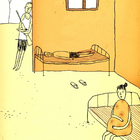
040 | A Child of Two Worlds
介绍: 040 | A Child of Two Worlds
A SOMALI proverb says that a woman should be either married or in her grave. And in the Horn of Africa, the proverb might as well go on to say that, if she is married, she had better be pregnant, nursing or postmenopausal.
My husband, Tom, and I moved to Somaliland nine years ago...
介绍: 040 | A Child of Two Worlds
A SOMALI proverb says that a woman should be either married or in her grave. And in the Horn of Africa, the proverb might as well go on to say that, if she is married, she had better be pregnant, nursing or postmenopausal.
My husband, Tom, and I moved to Somaliland nine years ago with our 2-year-old twins to work for a nongovernmental o.r.g.a.nization that aimed to serve the local population. But within a year, the escalating violence there forced us to evacuate (as in, grab what we could and run) and resettle across the border in Djibouti.
A couple of years later, when our twins, Magdalene and Henry, were 5, our Djiboutian Somali neighbors began suggesting that my next pregnancy was long overdue. Surely my marriage couldn't survive with only two children. And Asha, my landlady, added to the pressure, asking over chipped mugs of steaming shaah, or tea: "How are the kids? Are you pregnant?"
The trouble wasn't that I didn't want to have another baby, though part of me did fear the possibility of having twins again. The trouble was that I lived in Djibouti with neighbors like Yemen, Somalia, Eritrea and Ethiopia. Pirates in the Red Sea, border skirmishes with Eritrea, intermittent political tensions in Ethiopia, and Qaeda terrorists hiding out in Yemen. The trouble was that the nearest Western hospital was a four-hour flight away in Dubai. The trouble was that I was terrified to be pregnant and give birth in Djibouti.
Temperatures sometimes soared over 120 degrees. I heard stories of women being shouted at, pinched and slapped by hospital staff and female relatives during labor. I knew of the severe lack of midwifery skills outside the realm of female genital cutting. It was hard to find an opportune time when my heart, mind and body were ready to conceive.
And then, walking to school one day, Henry and Magdalene quit holding my hands. It happened simultaneously, as though they had planned it. I watched them skip into kindergarten and felt the emptiness of my fingers. I wiped a tear from my eye and decided it was time to face my fears. Six weeks later I was pregnant.
At Dar al Hanaan, the maternity hospital, women delivered flat on their backs with the midwives pressing down on their uteruses. Nurses pinched and insulted the laboring women if they made too much noise. No one was allowed to be in the delivery room other than the midwife.
"You got yourself into this," they would shout. "Didn't you know it would hurt? Stop being weak."
Sometimes women gave birth in the hallways, depending on how many beds were available.
I decided to do my prenatal appointments and delivery at the French military hospital, Bouffard. The anesthesiologist did little to reassure me.
"Sign this," he said in French, sliding a piece of paper across the desk. "It says you have considered the risks of giving birth in Djibouti, that we can't medevac you out, and that you understand there are no proper neonatal pediatricians and no neonatal care in the country."
I gulped and skimmed the paper, which also explained that, should I need a Caesarean, he would perform it.
"I recommend you go to France," he said. "Or Dubai."
I shook my head. "My husband is an English professor, and the university will already be in session. I can't do it alone."
He sighed and stamped the release form.
Asha kissed my cheeks when I told her I was pregnant and taught me a new proverb: the mouth of my grave is open.
"You should say this to people and ask them to pray for you," she said in Somali.
"You or the baby could die at any time. But it wouldn't be that bad if the baby died; you could always have another one. And you don't really love it yet, anyway — it's not born. So, it's O.K. if the baby dies."
"I don't want to talk about the baby dying," I said.
"You should say the proverb anyway," she said. "You are at a highly dangerous time of life."
Asha was right. In Djibouti, pregnancy was highly dangerous for both mother and baby. The infant mortality rate was among the highest in the world, more than 15 percent. The maternal mortality rate, while much lower, was still cause for alarm.
.......
文本过长,不能全部都放上来,如需完整版的文本,也可以移步到我的微信【下班哥泡英语】,回复“Modern Love”即可获取。




